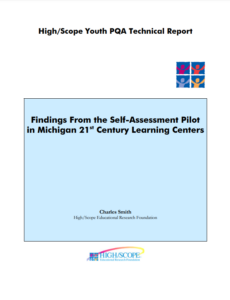Tag: Self-Assessment
January 1, 2005
Overall 24 sites within 17 grantees participated in the self-assessment pilot study by assembling staff teams to collect data and score the Youth Program Quality Assessment (PQA). Youth PQA data collected using the self-assessment method demonstrated promising patterns of both internal consistency and concurrent validity with aligned youth survey responses.
January 1, 2005
Overall 24 sites within 17 grantees participated in the self-assessment pilot study by assembling staff teams to collect data and score the Youth Program Quality Assessment (PQA). Youth PQA data collected using the self-assessment method demonstrated promising patterns of both internal consistency and concurrent validity with aligned youth survey responses.

